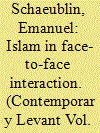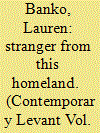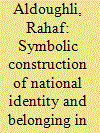| Srl | Item |
| 1 |
ID:
169283


|
|
|
|
|
| Summary/Abstract |
Zakat is the Islamic obligation to give away a share of one’s moveable wealth for the sake of the community—primarily supporting people in need. Based on fieldwork in the Palestinian city of Nablus (2013–2014) where institutional channels for distributing zakat had become blocked due to security crackdowns in 2008, this article analyses direct zakat practices where givers and receivers confront one another in face-to-face interaction. In Nablus, openly displayed material want was assumed to ‘expose’ people living in poor households as well as their relatives and neighbours. Against this background, direct zakat manifested itself as discreet gestures of ‘covering’ need, while people not asking openly for support tended to be praised for their shyness and piety. In direct zakat transfers, people actively cared for how they appeared to one another in social interactions. This ‘ethical work’ of presenting oneself involved reading signs, embodying Muslim virtues and invoking God as the sole source of material provision. Considering the Islamic tradition’s presence within social interactions, this article seeks to understand how Muslim piety exceeds the individual and how the moral responsibility to cover the needs of others is socially distributed.
|
|
|
|
|
|
|
|
|
|
|
|
|
|
|
|
| 2 |
ID:
169281


|
|
|
|
|
| Summary/Abstract |
A particular theme dominates contemporary heritage projects in the neoliberal context of Jordan: sustainable development on the basis of participatory approaches. Although these approaches are celebrated in academic and governmental circles, the history and power dynamics within which they operate remain underexplored. We aim to establish a theoretical framework that examines why and how local communities in the Arab region shifted from periphery to centre, and from background to foreground, in the field of archaeology and heritage. We situate archaeology and heritage within two seemingly different contexts, colonialism and neoliberalism, that have governed the relationship between the West and the Arab region. As we contrast colonialist exclusionary policies with the inclusivity promoted by neoliberal policies in archaeological and heritage projects in Jordan, we argue that despite the obvious differences between the two, they both managed to make substantial shifts in the perception of and attitudes toward archaeology and heritage. In spite of participatory paradigms, the shifts seem to have always come ‘from the outside’, operating on sites and peoples alike.
|
|
|
|
|
|
|
|
|
|
|
|
|
|
|
|
| 3 |
ID:
169282


|
|
|
|
|
| Summary/Abstract |
This article explores Mandate Palestine’s immigration policy through the stories of migrants and settled residents who attempted to resist government-issued deportation orders for their removal from the territory. Individuals who lived in and crossed the borders and frontiers of interwar Palestine without the necessary permissions from the mandate government began to negotiate their relationship with the state once they received deportation orders, had their identity documents revoked, or found themselves under arrest. Through a close reading of archival sources including petitions, letters court case extracts and police correspondence, the article argues that Palestine’s immigration and deportation policies caused and exacerbated precarity and dislocation, all of which represented elements of the modern experience of colonial citizenship.
|
|
|
|
|
|
|
|
|
|
|
|
|
|
|
|
| 4 |
ID:
169285


|
|
|
|
|
| Summary/Abstract |
This essay argues that the questions born of the conditions that marked the post-war period in Lebanon are folded over and replaced by another set of conditions of which neo-victimhood is most dominant. The time of the post war can be said to be over and now is followed by a time after time in which the figure of the neo-victim rehearses a monologue of victimisation allegedly beholden to the promise of a future liberated from all that is unfinished in the past. The figure of the neo-victim contaminates the historical anger of the unreconciled victim and further shuts down historical accountability as history becomes the horror of a history en abyme. Looking at documentaries, films and ex-combatant memoirs, this essay attempts to give form to this shift from post-war to a time after time.
|
|
|
|
|
|
|
|
|
|
|
|
|
|
|
|
| 5 |
ID:
169284


|
|
|
|
|
| Summary/Abstract |
This article investigates the relationship between the construction of masculinist national identity and the perpetuation of nationalist songs after the ascendance of the Syrian Bàth regime. Popular in schools and Bàth-affiliated organisations, and performed on national holidays and festivals, nationalist songs are an important component of Syrian oral culture. They are premeditated to construct a particular perception of national belonging and identity. Covering two different periods (the 1973 war to1990 and 1990–2007), the article examines the ways these songs construct the nation around the normalisation of sacrificial death and argues that, through the perpetuation of masculinist values as key characteristics of national belonging and identity, these songs obscure women’s status in Syrian political culture and contribute to their subordination.
|
|
|
|
|
|
|
|
|
|
|
|
|
|
|
|